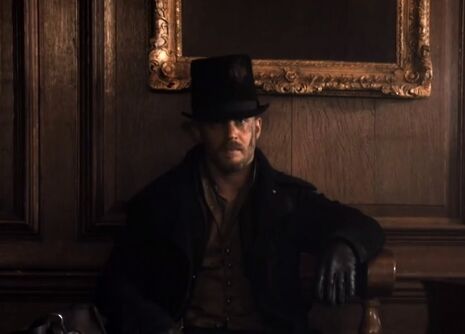TV Round-Up: Taboo (Part Three)
Six episodes in, Hardy and Knight’s period drama is starting to come apart at the seams…

As Taboo is beginning to draw to a close, I expected a fair amount from its latest instalments. As a lead-up to the series finale, these episodes should accelerate the tension that has been building successfully from the start. It should also give the viewers some kind of idea of where the series is heading to maintain their interest. However, for the first time since watching, I finished the penultimate episodes of Taboo feeling disappointed.
“One of the most important roles of storytelling is to question and explore the values we stand for, and so this is an achievement of Taboo that can’t be ignored”
The pace of the plot has been dragged out far too much, to the point where it is becoming increasingly hard to care about the lives and actions of the characters. The plot has been slow from the outset, but the shock factor of the ubiquitous brutality of the period, accompanied by the mysterious story, created a curious intrigue that sustained our attention. However, with the exception of the violent exorcism of Zilpha, which used cruelty as a major plot device – rather than as just a backdrop to the period – the violence has lost its original impact, transforming something that was ‘taboo’ into something that now seems commonplace.
In other words, these latest two episodes are almost unnecessary, and could have easily been fitted into just one, which would have sharpened the edges roughened by the slow pace. While this pace worked relatively well at first, reflecting the haziness of the story, in a drama where answers to questions are imperative to the tension, this mode of storytelling cannot be sustained throughout the whole series.
“Will Taboo continue down this disappointing path or will it come to a satisfying conclusion? It is almost impossible to predict”
What is more, the story itself is becoming more convoluted every week. The loose ends that were left in the initial instalments do not seem to be getting tied up. The result is that the very aspects of the plot that captured the interest of the audience in the beginning, such as the chase to find Delaney and his revelations about his past, are becoming tiresome. This is not to say that the latest episodes have been without twists and turns, but these developments have become almost farcical with the sometimes over-the-top involvement of characters such as Delaney’s estranged son. What was so captivating at the beginning appears to not have been planned out particularly well by Knight and Hardy.
However, the series remains marginally successful: it continues to challenge a one-sided view of society and humanity, using the marriage of Zilpha and Thorne to show that moral superiority in a certain socio-religious context does not necessarily equate to a universal definition of ‘good’ and ‘evil’. One of the most important roles of storytelling is to question and explore the values we stand for, and so this is an achievement of Taboo that can’t be ignored.
Considering this, the quality of Taboo has not worsened drastically. If these latest instalments were viewed as a stand-alone, there is no doubt that they would generate the same atmosphere and intrigue that the first episodes did. However, as the viewer comes to be familiar with the characters and the plot, there needs to be more drama to compensate for the loss of the original intrigue. Of course, the finale of the series will inevitably be the most important factor in its overall reception. Will Taboo continue down this disappointing path or will it come to a satisfying conclusion? It is almost impossible to predict
 News / Cambridge academics stand out in King’s 2026 Honours List2 January 2026
News / Cambridge academics stand out in King’s 2026 Honours List2 January 2026 Interviews / You don’t need to peak at Cambridge, says Robin Harding31 December 2025
Interviews / You don’t need to peak at Cambridge, says Robin Harding31 December 2025 News / AstraZeneca sues for £32 million over faulty construction at Cambridge Campus31 December 2025
News / AstraZeneca sues for £32 million over faulty construction at Cambridge Campus31 December 2025 News / News in Brief: Maypole mentions, makeovers, and moving exhibits4 January 2026
News / News in Brief: Maypole mentions, makeovers, and moving exhibits4 January 2026 Comment / Plastic pubs: the problem with Cambridge alehouses 5 January 2026
Comment / Plastic pubs: the problem with Cambridge alehouses 5 January 2026








